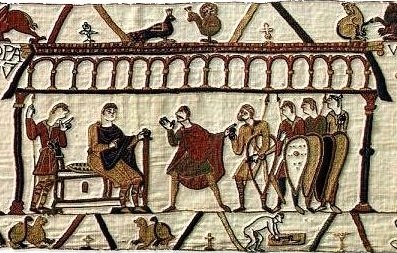
1094 AD
The death has just been announced of Wulfnoth, brother of King Harold and last survivor of the six sons of Earl Godwin and the Danish Princess Gytha. His death breaks the final link with the former ruling English family. Wulfnoth’s life was a sad and lonely one, spent largely in exile and very often in prison.
Born in 1036, and just 15 years old when he was given to Duke William as a hostage, he remained in custody for many years, though with some measure of freedom, at one time serving as a soldier in the Norman army. The conditions of his detention were not harsh while relations between Duke William and Earl Harold were peaceful. It is thought that one of the reasons for Harold’s visit to Normandy in 1065 was to negotiate the release of Wulfnoth and other detainees. It was during this trip that Harold is alleged to have sworn an oath to William that he would never seek the crown of England. If such an oath took place, it was famously never kept. The following year, 1066, saw William and Harold plunged into battle for the crown, at which time all hope of freedom for Wulfnoth was lost.
Norman resentment against Harold’s alleged perjury meant worsening conditions for Wulfnoth and his plight rapidly faded from public view. All his brothers perished in the same year – Tostig at Stamford, Harold, Gyrth and Leofwine at Hastings. Having no member of the family to plead his cause, he was completely forgotten by both sides.
When William the Conqueror died in 1087 Wulfnoth had been captive for 36 years. Due to be freed on the accession of William Rufus, the Conqueror’s second son, he nevertheless remained in captivity. Perhaps the new King found it politically expedient to hang on to the prisoner, although what possible threat might have been posed by a man absent from politics for a lifetime is not clear. Perhaps he had been institutionalised for so long that he was barely capable of an independent life. He had no remaining family, had never been permitted to marry and had spent years closely watched and under guard. Although his captivity was not harsh or brutal, he undoubtedly suffered from neglect, loneliness and boredom and had the appearance of a very old man by the time he came into the keeping of William Rufus. In later life he is said to have embraced monkish tastes, developing scholarly habits of reading, disputation and attending divine office.
Aged 56, and said to have been ill for some time, Wulfnoth was residing at the time of his death at Winchester Cathedral under the care of the Prior, Geoffrey of Cambrai who commented: “ He spent a lifetime in captivity and never committed a crime.”